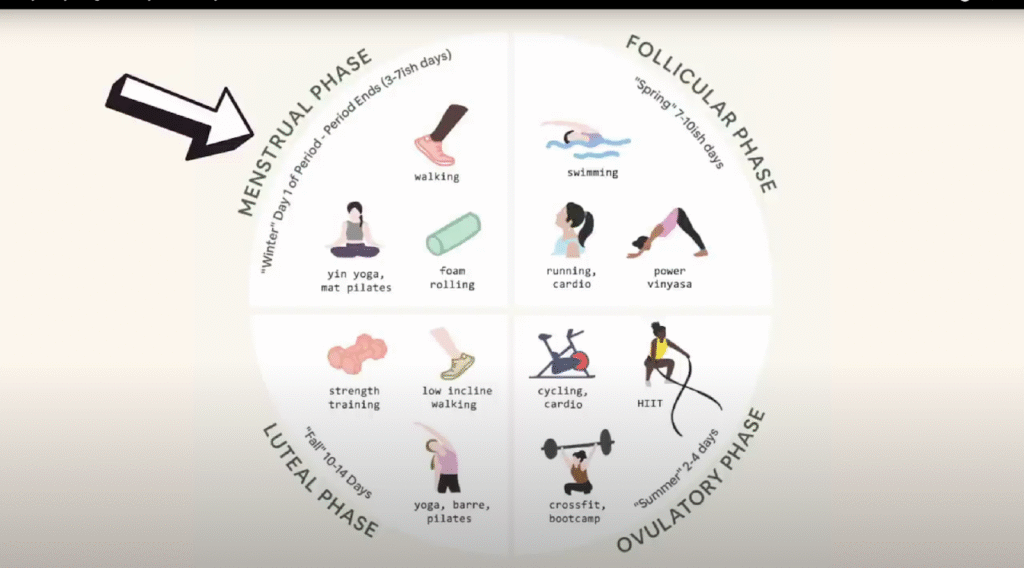Periods not coming on time? One month early, next month late? The calendar never seems to match what the body feels. Plans get cancelled, moods shift without reason, and everything feels out of control. It’s not about missing a date; it’s a sign of hormone imbalance or menstrual health issues.
But what if the solution isn’t about controlling the cycle, but understanding it? Cycle syncing offers a way to listen, adjust, and bring back balance to life.
Dr Shivanjali Nayak, a gynecologist in Kolkata, supports women in managing irregular periods through expert care.
To help you understand this better, this blog outlines the causes of irregular periods. It explains how cycle syncing, nutrition, and lifestyle changes can naturally improve hormonal balance and menstrual health.
Understanding Irregular Periods
Many women experience irregular periods at some point in their lives. But when it becomes frequent, confusing, or disrupts daily life, it’s time to pay closer attention.
A regular menstrual cycle lasts between 21 and 35 days. If periods come too early, too late, or don’t come at all for months, they are considered irregular. Some women may also experience heavy or light bleeding, spotting between periods, or missed periods altogether.
Common Causes of Menstrual Irregularities
Irregular period causes are different for everyone, but they signal a hormonal imbalance. This part outlines key factors affecting your monthly cycle timing.
1. Stress & Lifestyle Changes
- The problem: High stress levels, sudden weight gain or loss, or over-exercising.
- What happens: The brain stops sending the right signals to the ovaries.
- The result: Ovulation may not happen on time or at all. That delays or skips a period.
2. Medical Conditions
- The problem: Health issues like PCOS, thyroid imbalance, or endometriosis.
- What happens: These conditions interfere with hormones and ovulation.
- The result: Periods become irregular
3. Hormonal Shifts
- The problem: Imbalance in estrogen, progesterone, FSH, or LH.
- What happens: The hormones don’t rise and fall as they should.
- The result: The cycle loses its rhythm. Periods come late, early, or not at all.
Hormonal Factors Affecting Cycle Regularity
When hormones fall out of balance, cycles lose their regularity. Estrogen and progesterone are key in preparing the body for ovulation and menstruation. Disruption in either can delay or stop ovulation.
Other hormone‑related issues:
- Thyroid problems (hypo‑ or hyperthyroidism) can slow or speed up cycles.
- High androgen levels in PCOS interfere with ovulation.
- Stress raises cortisol, which in turn can influence reproductive hormones.
Health Implications of Skipped or Delayed Periods
Skipping periods isn’t unusual. But when it becomes frequent, there are risks:
- Fertility issues: If ovulation doesn’t happen, it becomes harder to conceive.
- Bone health: Low estrogen over a long time can weaken bone density.
- Endometrial health: Irregular shedding of the uterine lining leads to overgrowth.
- Emotional well-being: Mood swings, fatigue, anxiety, and irregular cycles. Living with unpredictability can add stress.
The Concept of Cycle Syncing
What Is Menstrual Cycle Syncing?
It refers to two different concepts:
- Menstrual synchrony: It is a debated phenomenon where women’s menstrual periods align due to close contact and shared environments.
- Cycle syncing (or menstrual cycle syncing): A lifestyle practice of adjusting diet, exercise, and other habits to align with the different phases of one’s own menstrual cycle.
Dr Shivanjali Nayak, a gynecologist in Kolkata, emphasises the importance of understanding each phase of the menstrual cycle.
How It Affects Hormones and Ovulation

Menstrual cycle tracking phases help to understand when hormones are rising or falling. For example:
- Follicular phase: estrogen rises, energy may increase
- Ovulation: hormone peaks, higher fertility, sometimes more energy
- Luteal phase: progesterone rise, possible symptoms like bloating or mood dips
- Menstrual phase: lowest hormone levels
Lifestyle Tips to Support Women’s Health & Fertility
Supporting women’s health starts with small daily habits. The table below highlights a simple diet and lifestyle for regular periods that can make a difference.
| What to Do | Why It Helps |
| Maintain a healthy weight | Supports hormonal balance and regular ovulation |
| Eat a nutrient-rich diet | Provides essential vitamins and minerals for reproductive health |
| Avoid smoking | Smoking can damage eggs and reduce fertility |
| Add Omega-3 fatty acids (e.g., fish, walnuts) | Supports hormone production and reduces inflammation |
| Limit alcohol and caffeine | Helps maintain hormonal stability, fertility, and menstrual health |
| Manage stress with sleep and relaxation techniques | Chronic stress can disrupt the menstrual cycle |
| Use workplace/community health programs | Access to preventive care and education improves long-term health |
Techniques to Sync Your Menstrual Cycle
Tracking Ovulation and Cycle Patterns

Keeping track is the foundation. Methods include:
- Using a calendar or period‑tracking app
- Monitoring basal body temperature (BBT)
- Noting changes in cervical mucus
- Keeping track of mood swings, sleep, appetite, and physical symptoms
Diet and Nutrition for Phases of the Menstrual Cycle
| Cycle Phase | What to Eat | Why It Helps |
| Menstrual Phase | – Iron-rich foods: spinach, lentils, beets- Anti-inflammatory foods: turmeric, ginger-Warm fluids and soups | – Replenishes iron lost during bleeding-Reduces cramps and bloating |
| Follicular Phase | – Lean proteins: eggs, chicken, tofu- Fresh fruits & veggies- Seeds: flax, pumpkin | -Supports rising estrogen levels-Boosts energy and cell repair |
| Ovulation Phase | – Zinc-rich foods: sesame seeds, chickpeas- Antioxidants: berries, citrus fruits- Omega-3s: salmon, walnuts | -Supports egg release-Protects cells from oxidative stress |
| Luteal Phase | – Magnesium-rich foods: bananas, dark chocolate, leafy greens- Complex carbs: sweet potato, oats- Herbal teas | -Helps manage PMS, mood swings, and cravings-Keeps blood sugar stable |
Struggling with a hormonal imbalance? Get expert help from Dr Shivanjali Nayak, a gynecologist in Kolkata, and learn how to sync your diet with your cycle.
Exercise and Lifestyle Adjustments
Balanced habits and movement support a healthy, regular menstrual cycle.
- Do light stretching or yoga during your period.
- Try cardio or strength training during the follicular phase.
- Do moderate workouts like walking during the luteal phase.
- Get 7–8 hours of sleep every night.
- Drink plenty of water to stay hydrated.
- Avoid over-exercising or skipping meals.
- Take short breaks from screens and long sitting hours.
- Practice deep breathing or meditation to reduce stress.
- Cut down on junk food, caffeine, and sugar.
- Keep a regular routine for meals and sleep.
When to Seek Specialist Help
Seek medical help if:
- Irregular periods persist over several months (e.g. more than 3 missed cycles)
- Very heavy bleeding or prolonged periods
- Severe pain, spotting between periods
- Signs like sudden weight gain/loss, mood disorder, hair changes
Case Study
1. Patient Name: N/A (Group study of multiple participants)
2. Age / Gender: Mean age 22 years / Female
3. Health Concern / Symptoms Reported:
Observation of whether the periods (menstrual cycles) of women living together tend to sync over time
4. Diagnosis:
Menstrual cycle synchronisation observed among female roommates living in shared accommodation
5. Treatment Given:
No medical treatment was provided; this was a purely observational study
- 62 female medical students were tracked monthly for 13 months
- Each participant had regular menstrual cycles (between 26–32 days)
- Period start dates were collected using online forms.
- Changes in cycle timing were measured and analysed statistically.
6. Outcome / Result :
- Over a period of 13 months, the study found that more than half of the female roommates living together started to get their periods around the same time.
- At the beginning, their period start dates were about 7–8 days apart.
- By the end of the study, the gap became smaller—around 6 days.
- This means that when women live closely together for a long time, like in a hostel room, their menstrual cycles can gradually shift and start happening closer to each other.
- This natural syncing may be helpful in the future for fertility treatments or family planning.
How Syncing Your Cycle Can Improve Well-being
Irregular periods are a sign that the body needs support. By syncing daily habits with the menstrual cycle, it’s possible to bring back balance naturally. Small steps for syncing periods naturally include eating right, moving mindfully, and tracking your cycle can improve hormone health, mood, and overall well-being, one phase at a time.
Book an Appointment
Worried about irregular periods? Book a consultation with Dr Shivanjali Nayak, a gynecologist in Kolkata, and get the answers you need.
People Also Ask (FAQs)
- What is cycle syncing for irregular periods?
Cycle syncing for irregular periods involves adjusting daily life, including diet, exercise, and rest schedules, based on each phase of the menstrual cycle. It aims to support hormone balance and reduce symptoms, making cycles more regular over time.
- Are there any risks to cycle syncing?
Cycle syncing is low risk for most people. It is not a substitute for medical care. In cases of PCOS, thyroid disorders, heavy bleeding, or underlying conditions, professional guidance is essential. Also, generic advice might not work for everyone.
- What to eat for cycle syncing?
Foods to eat include:
- Iron‑rich foods and anti‑inflammatories during menstruation
- Lean proteins, whole grains, and healthy fats during the follicular and ovulation phases
- Complex carbohydrates, magnesium‑rich foods in the luteal phase
- Drink plenty of water and reduce your intake of sugar and processed foods.
- Does cycle syncing help with fertility?
Cycle syncing may help by making ovulation easier to identify and supporting hormone balance. For some, this increases the chances of conception. But it’s not a guaranteed fertility treatment; medical evaluation is important if there are fertility concerns.






